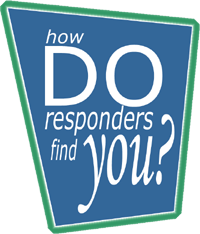REDUCE 9-1-1
DELAYS

This 5 Minute Task
Could Save Your Life!
Addressing that Works!
Examples for good address signage.

Good Addressing Helps Everyone
When Seconds Count
Don't Keep Them Guessing
Download the Guidelines
Because help often arrives from the opposite direction of the USPS, only 50% of your street addresses are visible to a 9-1-1 responder.
Donít keep them guessing! Proudly identify your street address on BOTH sides of your mailbox using a minimum of 3-inch high white reflective numbers on a dark background.
Ask yourself, can a 9-1-1 responder see my address at 11:00 PM arriving from the opposite direction of the mail service in the rain at a distance of 100 feet traveling at 30 MPH? At that speed the address will only be visible for 2.3 seconds.
 Did your 9-1-1
first responder drive past your location,
maybe twice, looking for the correct
address? The smartest thing you
can do is
have 9-1-1 address signage that works well
both day and night.
Review
the good signage/bad signage
guidelines below. Set a good example
for your neighborhood!
Did your 9-1-1
first responder drive past your location,
maybe twice, looking for the correct
address? The smartest thing you
can do is
have 9-1-1 address signage that works well
both day and night.
Review
the good signage/bad signage
guidelines below. Set a good example
for your neighborhood!
A first responders priority is to respond to your location SAFELY! Our country legislates signage for roadway signs and vehicle signs (license plates) to assure good visibility day and night, but not property address signage. The USPS only requires one inch high letters in a contrasting color on the carrier's arrival side of the mailbox. Woefully inadequate signage can be a serious distraction to first responders, affecting both response time and safety. The difference between knowing an address and finding an address could affect your well-being.
When seconds count, help by clearly identifying your street address on BOTH sides of your mailbox using a minimum of 3-inch high white reflective numbers on a dark background.
 If you live in an area that uses community mailboxes rather
than individual mailboxes or you use a PO Box, it is
important to display your address on your house using a
minimum of 4-inch high numbers that are well lit and have a
high contrast to the background, both day and night. As an
alternate, place a 3 foot high post with the address sign
located near the roadside, visible from both directions.
If you live in an area that uses community mailboxes rather
than individual mailboxes or you use a PO Box, it is
important to display your address on your house using a
minimum of 4-inch high numbers that are well lit and have a
high contrast to the background, both day and night. As an
alternate, place a 3 foot high post with the address sign
located near the roadside, visible from both directions.
Watch
How to Reduce 9-1-1 Delays!
Documents to Reduce 9-1-1 Delays
The information,
documents and downloads on this website are open source and free to download
and use for your organization. Under no circumstance are they to be sold or
used to make a profit. All Rights Reserved - Lee Hite
Reduce 9-1-1
Delays (Checklist)
Items for
the 9-1-1 Premise Page
Emergency Medical Data
Sheet English
9-1-1 Addressing That Works
Emergency Medical Data
Sheet Spanish
Emergency Shut-Off Signage
Emergency Medical Data
(Long Form English)
Healthy Hydrants Guideline
Emergency Medical Data
(Example)
It's Okay to ASK
Alternate Key Holder
Registration
Sirens & Lights Guidelines
Alternate Key Holder
Information
Family Records Retention
Forms
Become a Helpful Responder Ė Not a Helpless
Bystander